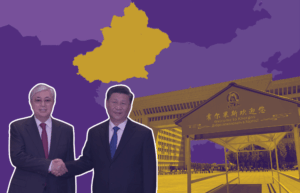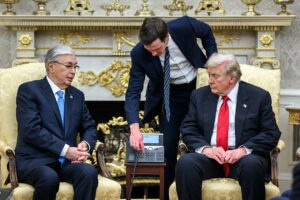Over thirty years after the Soviet Union’s collapse, colonial influences persist in Kazakhstan. Russian remains widely spoken and serves as the primary language for interethnic communication. As language is a vital symbol of national identity, the enduring linguistic prominence of Russian poses a significant challenge to fully decolonising Kazakh identity. However, the invasion of Ukraine has spurred a young, urban middle class to confront these imperial remnants by reclaiming their native language.
Russia’s colonial war against Ukraine has sent shockwaves throughout Central Asia. Moscow’s emphasis on historical, cultural and linguistic connections makes other former Soviet republics feel increasingly uncomfortable.
Especially in Kazakhstan, home to a sizable ethnic Russian population, many fear that their country could be next on the Kremlin’s list. These concerns are not unfounded. Since the start of the war in Ukraine, Russian propagandists have repeatedly voiced thin-veiled threats about annexing parts of their southern neighbour.
Moreover, after partial mobilisation was announced in Russia in September 2022, hundreds of thousands of predominantly young men fled across the border into Kazakhstan. Their arrival has exacerbated existing concerns, and magnified domestic tensions between social groups that identify themselves differently.
Although over the past three decades, Kazakhstan’s government has attempted to forge a new national identity, Russian influence remains. Since the conquest of the Kazakh steppe in the 19th century by tsarist forces, the lands and the people inhabiting the territory of modern-day Kazakhstan were shaped by imperial rule. First by the Russian Empire, then by the Soviet Union.
In the 20th century, forced collectivisation uprooted traditional lifestyles and led to famine. Countless people flocked to towns and cities in a desperate search for food and work, places which themselves were colonial spaces, dominated by imperial infrastructure and buildings. Rapid urbanisation and industrialisation have scarred the landscape and still cause pollution and environmental and health problems to this very day.
Russia’s linguistic legacy
But apart from these more abstract, postcolonial realities, there is the pertinent yet controversial issue of language. In the wake of Russia’s invasion of Ukraine, many have grown painfully aware of the influence Russia still exerts over Kazakhstan through language.
Over thirty years after independence, Russian remains the country’s main interethnic language. Political scientist Dossym Satpayev, in a piece for Chatham House, writes that Russification policies in the colonial era suppressed the Kazakh language so thoroughly that most forgot how to speak their native tongue. As the de facto official language of the USSR, speaking Russian was key to social mobility.
After the collapse of the Soviet Union, the benefits of learning the Kazakh language remained negligible. Although Kazakh is the state language, and Russian a mere ‘official’ language, in reality, Russian-speakers still enjoyed significant privileges and advantages. Until recently, insufficient knowledge of spoken Kazakh was hardly considered a problem, as Russian proficiency was enough to live a comfortable life, especially in the north and in the cities, where most of Kazakhstan’s Russian-speaking population is concentrated.
In education, Russian has been more advantageous for increasing the possibilities to study at renowned schools and universities in Russia, partly because of the availability of a broader range of academic resources. Similarly, career-wise, Russian speakers have traditionally had more job opportunities. By contrast, Kazakh was viewed as backward and inferior, as sociologist Azamat Junisbai remembers how, while growing up, he associated the Kazakh language exclusively as rural, uncultured and of low status.
Read more on Novastan: “Alaqan” – Aida Adilbek’s decolonial documentary cinema
Fear for antagonising Moscow
Initially, Kazakhstan’s government made little effort to support the elevation of the Kazakh language. Policymakers were concerned that such a stance would feed into rising Kazakh nationalism, which in turn could endanger the country’s inter-ethnic stability.
So, from the 1990s onwards, it chose to counter early national-patriotic movements by prioritising the development of a Kazakhstani civic identity. This civic identity, epitomised by the slogan ‘unity in diversity,’ sought to rally all people of Kazakhstan around the flag of the newly independent republic, regardless of ethnicity.
However, the main threat to inter-ethnic stability did not emanate from Kazakh nationalism, nor from the country’s sizable Russian minority. As a matter of fact, Astana’s stance on the issue was long guided by the fear that, should it have followed a more ethno-national course, Kazakhstan would have risked antagonising its northern neighbour.
Demographics driving change
Meanwhile, it was increasingly difficult for the government to balance the national interest against grassroots calls for the strengthening of Kazakh ethnic identity. After independence, millions of Russians left Kazakhstan, dramatically changing the country’s demographic make-up. Kazakhs now form a clear majority. They are the country’s fastest–growing ethnic group, and their proportion of the total population is only expected to increase.
Satpayev, in his contribution for Chatham House, argues that the strengthening of national-patriotic sentiments and movements is occurring organically. Based on demographic trends, support for a Kazakh ethnic identity will continue to grow, while the use of the Russian language is expected to decline.
The Russian invasion of Ukraine catalysed societal developments resulting from these demographic developments, which are shaping current and future political preferences. Not so long ago, the debate on national identity was quite marginal, predominantly talked about among small-circles of Kazakh-speaking intellectual elites. The war has caused this discussion to spillover into public domain, with an ever-increasing number of people rediscovering what it means to be Kazakh in the context of persistent colonial legacies.
Language as a decolonial tool
Language possibly is the most enduring bastion of Russian influence in Kazakhstan. In an episode of RFE/RL’s Majlis Podcast, sociologist Junisbai discusses how older generations primarily engage with Russian media, which makes them more susceptible to Russian propaganda. Consequently, the idea of so-called benevolent colonialism still is widespread among the elderly. Many believe that Kazakhstan owes much to foreign rule, such as industrialisation and modernisation.
Read more on Novastan: Pressure from Russia increases on Central Asian media outlets
This sentiment is not shared with younger generations. They have no living memory of the Soviet Union, and seek to undo the final vestiges of Russian and Soviet colonialism in pursuit of a new Kazakh identity. For them, language is a tool for decolonisation. On the streets, for example, this is reflected in the growing popularity of fashion brand Qazaq Republic. This company, famous for its trendy clothing and other merchandise with patriotic Kazakh and English language slogans, owes much of its success to ongoing societal developments.
In an article by media outlet The Diplomat, Biybaris Seitak — founder of a popular Kazakh language Instagram channel Kazakh Bubble — says that the Russian invasion of Ukraine made many Kazakhs realise “that speaking Kazakh was a matter of national security.” The war has made them feel uncomfortable talking about decolonisation in the language of the former coloniser.
Hence, Russia’s invasion caused many to put words into deeds. The popularity of Kazakh language schools and clubs has exploded, and Kazakhstan’s government has jumped the bandwagon by introducing new plans promoting the Kazakh language.
Even though President Kassym-Jomart Tokayev has stated that the proposed alphabet reform, which would see the transition of written Kazakh from Cyrcillic to a Latin-based script, should not be ‘rushed’, he has introduced several other plans for a more independent language policy. These include a mandatory Kazakh language test for people wanting to obtain citizenship, a draft plan for a new media law to increase the use of the Kazakh language, and education reforms aimed at boosting Kazakh proficiency.
An unstoppable development
Yet, fears of backlash remain. The growing importance of Kazakh could alienate the non-Kazakh speaking population, such as the country’s still significant Russian minority. Satpayev, in his work for Chatham House, described that these people could feel ‘trapped’ or even discriminated against. A conflict of identities looms, heightening the risk of radicalisation and pro-Russian separatism which could trigger a response from Moscow.
Read more on Novastan: “An escalating manifestation of Russophobia” – Kazakhstan at the epicentre of an information war
Prior to the full-scale invasion of Ukraine, Russia used the perceived infringement of Russians’ rights abroad to intervene in neighbouring countries, either diplomatically, economically or militarily. However, chances of Russia invading Kazakhstan for the promotion of the Kazakh language are slim. Moscow is preoccupied on other fronts and, more importantly, it needs Kazakhstan for economic reasons, including for the import of dual-use goods that help Russia sustain its war effort against Ukraine.
In short, neither Astana nor Moscow is in the position to stop the growing importance of the Kazakh language in Kazakhstan, even if they wanted to. The war in Ukraine and tensions with the West are currently constraining any meaningful Russian response. In parallel, demography is pushing Tokayev’s government ever-closer towards embracing a more ethno-centric national identity. What the future holds remains to be seen. Yet, as long as this geopolitical reality persists, the decolonisation of Kazakhstan is expected to continue.
For more news and analysis from Central Asia, follow us on Twitter, Facebook, Telegram, Linkedin or Instagram.
 The Lexicon of Kazakh Decolonisation
The Lexicon of Kazakh Decolonisation 



